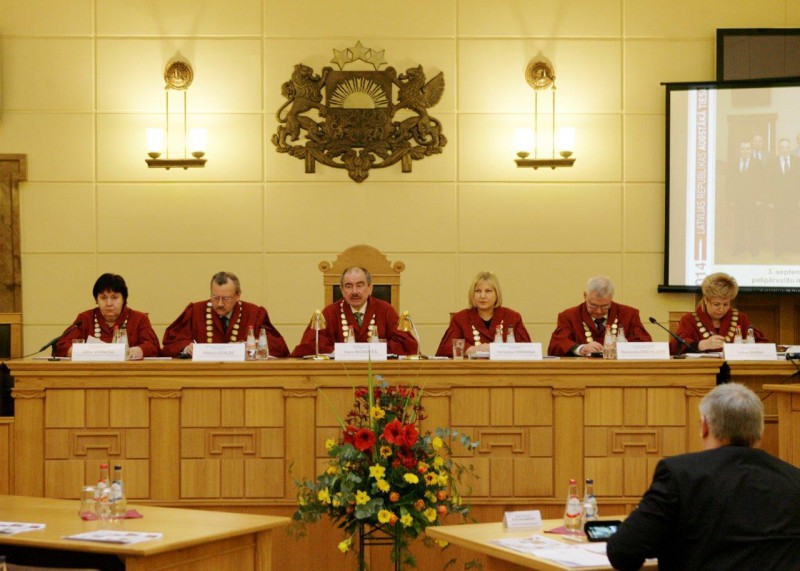9 March, 2015
At the Plenary Session of the Supreme Court: Edite Vernusa, d.d. of the Chair of the Department of Civil Cases, Peteris Dzalbe, the Chair of the Department of Criminal Cases, Ivars Bickovics, the Chief Justice of the Supreme Court, Veronika Krumina, the Chair of the Department of Administrative Cases, Raimonds Gravelsins, the d.d. of the Chair of the Chamber of Civil Cases, and Inara Garda, the Secretary of the Plenary Session
Last year the Supreme Court experienced the most significant changes in its structure since previous system was established 20 years ago, and it worked in very intensive regime, having reviewed more than 4500 cases, – Ivars Bickovics, the Chief Justice of the Supreme Court, pointed out at the Plenary Session of the Supreme Court held on 6 March, when analysing performance of the last year.
Passing over to the Supreme Court as only cassation instance, the Chamber of Criminal Cases ceased to exist in 2014, and procedure of liquidation of the Chamber of Civil Cases is marked in legal provisions, the Chief Justice does not have deputies any longer, significant amendments to law regarding review of cases in the highest court instance were made – these and other changes both affected work of the Supreme Court by increase of work load and developed emotional tension. The Chief Justice of the Supreme Court pointed out that the court fulfilled its tasks in good faith and it has high ratings of trust both in assessment of politicians and executive power, which is approved by the wish to extend functions of the Supreme Court, and in assessment of society, which is marked by even increasing number of cases appealed before cassation instance.
The Plenary Session urges re-distribution of judges’ offices between the Department of Civil Cases and the Department of Criminal Cases
In their annual reports, the Chairs of Departments of the Supreme Court not only analysed performance of last year, which testifies of intensive work in all departments, but also expressed proposals of solution of the main problem – large number of cases pending.
Thus, Edite Vernusa, the discharger of duties of the Chair of the Department of Civil Cases promoted to perform entrenched research and to extend categories of cases, which may not be appealed in cassation instance at all, and to grant legislative initiative to the Council for the Judiciary to accelerate procedure of improvement of laws. Peteris Dzalbe, the Chair of the Department of Criminal Cases, stressed the necessity to strengthen the appellate instance. Veronika Krumina, the Chair of the Department of Administrative Cases pointed out that that it would be possible to solve this problem by increasing number of qualified assistants to judges rather than increasing number of judges in the Supreme Court.
The largest accumulation of cases pending has been preserved in the Department of Civil Cases for a long time. In 2014, the department was able to review only 40 per cent of cases processed and accumulation reached 2085 cases pending by the end of the year. To compare with other departments – number of cases pending was 505 cases in the Department of Administrative Cases and 107 cases – in the Department of Criminal Cases. Observing this fact, the Plenary Session of the Supreme Court decided to ask the Council for the Judiciary to transfer two of vacant judges’ offices from the Department of Criminal Cases to the Department of Civil Cases.
See statistics on review of cases in the Supreme Court here
See all information about the Plenary Session of the Supreme Court here
Information prepared by
Rasma Zvejniece, the Head of the Division of Communication of the Supreme Court
E-mail: rasma.zvejniece@at.gov.lv, telephone: 67020396, 28652211


